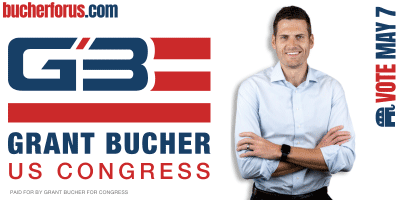STRAIGHT FROM THE SENATE
 Bankruptcies +
Bankruptcies +
Foreclosures =
Need For Financial Literacy
by State Sen. David Long
Lost among the headlines about today’s economic roller coaster are the uncomfortable financial ups and downs facing individual American households.
Unfortunately, too many are being caught completely upside down on home, car, truck and credit card debt – including fellow Hoosiers we all know and care about.
For too long, Indiana has been leading or nearly leading the nation for personal bankruptcies and home foreclosures. Hoosiers’ credit card debts have been piling up as well.
Indiana ranked 6th last year among the 50 states in bankruptcy filings, according to the American Bankruptcy Institute. Hoosiers were 10th in home foreclosure filings in 2007 with 52,930 residential mortgages in jeopardy. Our state was 21st nationally in credit card debt with Indiana borrowers owing an estimated $1,690 on plastic, according to Americans for Fairness in Lending.
Part of these calamities-in-waiting is attributable to predatory mortgage lending, which Indiana lawmakers attacked last year. However, the most cost-effective way of dealing with bankruptcies and foreclosures—both in financial and human terms—is to prevent them from occurring in the first place. In addition to legislative efforts to control lenders, new preventative education to forewarn borrowers is necessary or the situation could worsen still.
Statistics nationwide indicate a need for improved financial literacy—especially among our younger generation—as they are increasingly targeted by creditors and likely to face scaled back pension, investment and insurance plans throughout their budding careers:
One third of high school students surveyed nationwide reported having access to credit cards;
Approximately 56 percent of college undergraduates reported first receiving their own credit card(s) at age 18, and Labor statistics showed employee-sponsored pension plans had declined in 2004 to cover just 46 percent of workers nationwide.
Taxpayers and teachers invest enormous resources to help ensure graduating students can earn pay checks, but too often overlooked is another important focus — how to wisely spend and invest those pay checks.
What’s worse is that much of the economics coursework currently offered to our K-12 students is proving to be too little, too late.
Currently, Indiana students are not required to take any courses in order to graduate on balancing checkbooks, preparing household budgets or handling personal finances. As a result, approximately half of K-12 students across Indiana are not receiving any formal education related to financial literacy, according to research by Networks Financial Institute at Indiana State University.
Students statewide are now required to successfully complete a single, one-semester class in world and national economics, but not personal finance. What’s worse is this single, one-semester econ class has generally been offered and taken during their senior year. Unfortunately, only 76.5 percent of Indiana students earn their diplomas within four years—meaning it is likely about one in four Hoosiers has never received even this limited economic understanding.
Statistically, dropouts often come from challenging socio-economic backgrounds. So sadly, the same ones finding themselves caught in a cycle of poverty may never receive even basic instruction that might help them break that vicious cycle.
These cold facts not only tell me Indiana needs more financial literacy efforts in our schools, but also earlier, age-appropriate financial literacy at different grade levels – perhaps some basics in elementary school, some budgeting in middle school and more advanced micro and macro economics earlier in the high school experience.
Students’ need for more extensive financial literacy is fast becoming recognized by many states across the country. In 2008, 87 bills aimed at establishing and improving financial literacy were considered in 31 states. Yet, in spite of this growing recognition of the problem, only 8 states—Georgia, Idaho, Illinois, Louisiana, Missouri, New Mexico, South Dakota and Utah—currently require students to take a personal finance course as a high school graduation requirement, according to the National Council on Economic Education. Indiana is not yet among these eight financial literacy leaders.
Hopefully, change is on the way. Our own Indiana Department of Education has already proposed a framework for financial literacy that describes the knowledge students should have in six categories at three benchmark grades—4th, 8th and 12th. Perhaps soon those proposals will become integral parts of lessons taught in classrooms across Indiana.
A time-honored adage instructs us to “Let the buyer beware.” Unfortunately, too many of our fellow Hoosiers are ill-prepared to truly heed that advice. Lacking formal training, they must rely on advice of infomercials, friends likely in their own economic class or family who “don’t talk about money” for their chance at financial success in life. Clearly, Indiana should begin investing time and energy into providing financial literacy instruction, so today’s students will not become tomorrow’s bankruptcy and foreclosure statistics.
Sen. David Long (R-Fort Wayne) is President Pro-Tem of the Indiana Senate. He serves District 16, which includes portions of Fort Wayne.
- Celebrating 20 Years Of Community At The Stand - April 12, 2024
- First Positive Case Of Chronic Wasting Disease In Indiana - April 12, 2024
- Southwest Allen County Schools Embark On Major Tree Plantings - April 12, 2024


